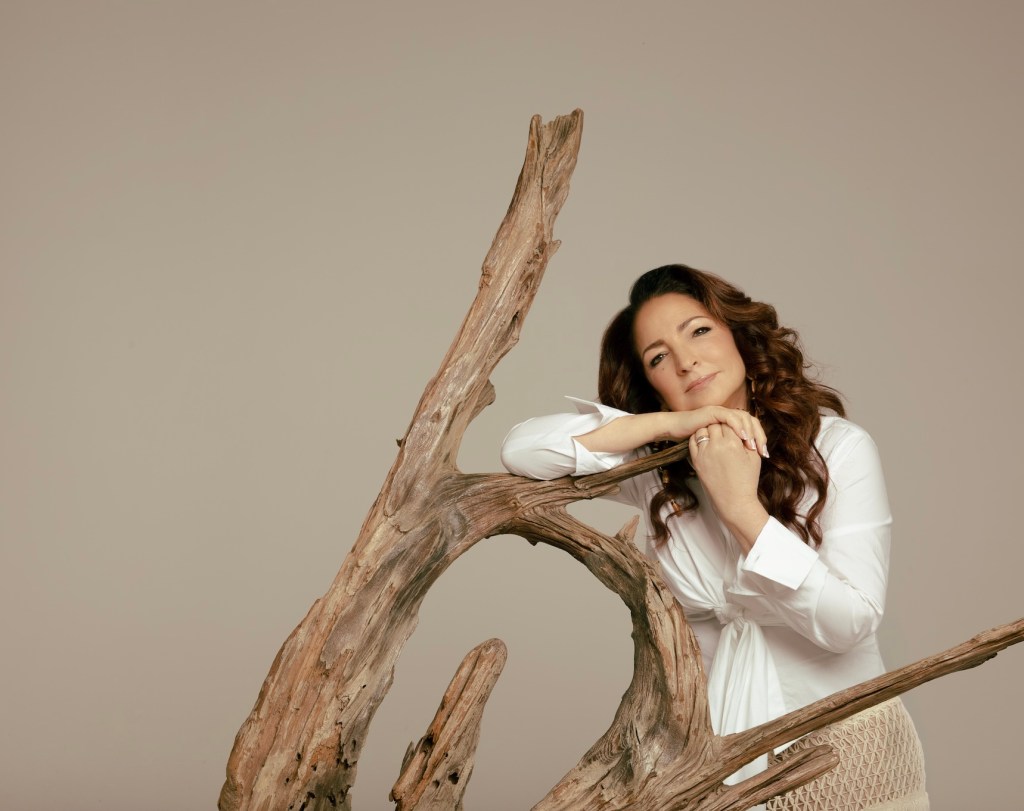
Photo by Bernando Doral and Gato Rivero

Audio By Carbonatix
Gloria Estefan laughs when you call her “tía,” the warm Miami shorthand that feels like family to anyone who grew up with her records playing in the background. “Tú eres la tía de todo el mundo,” I say in the middle of our conversation, half-joking, half-awed. She answers in that dry, honest voice that has carried entire dancefloors for decades: the number — 50 years — “doesn’t feel like fifty,” she says, “because when you love what you do, time moves fast.”
That speed is part of the story: a roller-coaster of late-night rehearsals, small gigs, and sudden international breakthroughs. But the origin is quieter than most expect. Estefan’s first big public moment wasn’t at a stadium — it was at a wedding. While still a student, she and her cousin were guests at a Cuban wedding at the Dupont Plaza Hotel; they were asked to sing impromptu, impressed the Miami Latin Boys, and were invited to join the band. That moment, thrown into a crowded hotel room, becomes the hinge of a career that would help put Miami on the global musical map.
The new album Raíces, released in May 2025, feels like a full-circle statement: an embrace of the music that shaped her and a reminder that the roots she sings about are still alive. The record — a lush, generational album of tropical rhythms and intimate storytelling — debuted to strong early attention and has already landed Estefan back in the conversation at this year’s Latin Grammys, where Raíces secured major nominations (including a nod in the Album of the Year field). The album’s arrival, timed with this golden anniversary, turned a career milestone into a moment of cultural return.
Estefan traces her musical resilience to family stories and the strangely tender discipline of her childhood: “I felt old when I was young,” she tells me, recalling responsibilities that landed on her as the eldest daughter and granddaughter. Music, she explains, became the way she kept herself whole. She would close her bedroom door, pick up a guitar and — in those quiet rooms — keep herself strong. That intimacy is still what she calls the engine: “The music saved me,” she says. “And it still does.” This is not a soundbite but a through-line; from Cuban standards at a family wedding to the stadiums that would later sing her choruses back to her, the emotional honesty is constant.
There are, of course, landmark headlines in the Estefan story. “Conga” — the Miami Sound Machine anthem that broke out in the early 1980s — became a global moment, a track that announced a bilingual, bicultural pop presence on the world stage. In the decades since, Estefan has collected honors that map the broadness of her influence: multiple Grammy and Latin Grammy wins, a Kennedy Center Honor, induction into halls of fame, and the Presidential Medal of Freedom, among them. Those accolades are signposts, but she frames them as responsibilities: “When you move people, what you put in the universe affects others,” she says. “It is a privilege and a responsibility.”
She remembers the garage rehearsals, small neighborhood gigs, and the sheer joy of “trying things” — Portuguese bossa nova turns, disco inflections, sudden experiments with arrangements that now read like obvious genius. “We didn’t think about what was going to happen,” she tells me. “We were just having fun.” That fun and that fearlessness later translated into crossover success at a time when the structure of pop radio and the marketplace made cultural crossing much harder. She and Emilio purposely built an expansive sonic vocabulary, and Miami — the city of the Miami Sound Machine — watched, changed, and grew alongside them. Today’s Miami, she says, is international and vibrant in ways that would have been unimaginable in those early nights.

The last few years have shown how Estefan re-invents while remaining unchanged at her core. She’s continued to produce and collaborate, expand into storytelling (a stage musical about her life reached Broadway in the 2010s), and even bring music into visual media and family projects. Her business ventures — restaurants, hotels, cultural projects — are another part of the civic imprint she and her husband Emilio Estefan have left on South Florida. She speaks about discipline on tour, of the physicality of performing, and the balancing act of being a mother on the road: the runs, the strict hydration, the regimented voice care. The myth of the effortless pop star evaporates in those details; what remains is a picture of hard-earned craft.
And then there’s family as legacy: the glow she gets when she sees Emily onstage — “that edge that is hers” — and the unfiltered joy of being a grandmother. She tells me about Sasha, her grandson, and how the “artistic vein” is already visible in him: “He has music in his body,” she says with a smile. For Estefan, legacy is not trophies or plaques — it’s seeing the next generation standing where she once stood, hearing a familial cadence show up in a child’s laugh or in a melody played at the kitchen table. Those moments, she says, are her favorite kind of success. (And yes, there’s a song she wrote for her grandson — another small, true thing that will travel in family playlists.)
Beyond the personal warmth and large-stage victories, this 50th year has produced cultural moments around Estefan: renewed profiles, anniversary performances, and a rebirth of public interest in the story that began in Miami’s Cuban neighborhoods and grew into global pop. Press cycles, award nominations, and Billboard conversations have returned to the long arc — from the Dupont Plaza wedding to Raíces’ Latin Grammy push — and framed Estefan as both a founding mother of Latin crossover and an artist still actively shaping the landscape.
When I ask what she might change if she could go back, her answer is soft and direct: pay more attention to being in the moment. “Sometimes you’re hanging on by your fingernails,” she admits. But then — almost immediately — she says she wouldn’t change a thing. The miracle, for her, is not a different timeline but the fact that the music still sings back at her: that the wave still connects people across languages, borders, and generations. In a career that started with an unexpected wedding duet and now faces new chapters — a Grammy-season comeback, new theatrical work, family projects — that continuity feels like both compass and anchor.
Fifty years is a lot of tape, and the catalog could fill entire libraries. But in the end, Estefan keeps returning to the same quiet truth: music is medicine, it is community, and it is the space where she learned to be herself. That, she tells me, is the most important part of being “tía” to a city — and to a world that still wants to dance when she says, “¡Conga!”
Gabby’s Dollhouse: The Movie
Gabby’s Dollhouse premieres in theaters on Friday, September 26. A family-friendly, hybrid live-action/animated musical fantasy comedy film. Estefan voices Grandma Gigi, a lead role alongside Laila Lockhart Kraner (Gabby) and Kristen Wiig (Vera). Gabby embarks on a road trip with her grandmother to “Cat Francisco,” where her dollhouse gets stolen by an eccentric cat lady. Together, they must retrieve it and reunite the Gabby Cats.
This movie marks a special crossover for Estefan into mainstream family animation — her first theatrical voice/acting role in this kind of project — expanding her artistic footprint beyond music.
The upcoming months will be busy ones for the Queen of Latin Pop. Just days after Gabby’s Dollhouse premiere, on October 5, Estefan will headline a major live concert at Madrid’s Plaza de Colón, celebrating both Hispanic Day and her 50-year career milestone. Raíces, her latest album, is a top contender at the Latin Grammy Awards on November 13. Meanwhile, buzz is building around Basura — a new musical co-created with her daughter and eyeing Broadway. Between selective tour dates and reflective media appearances, she’s also carving out time to enjoy life with family.